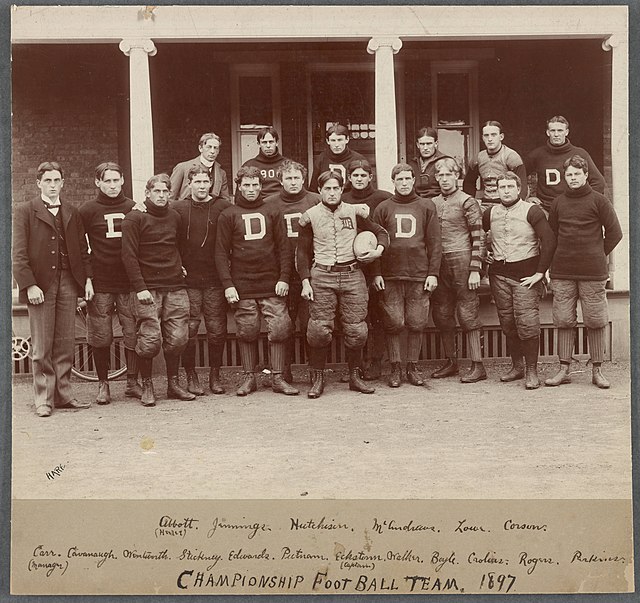
On a picturesque, fall afternoon, our fighting Dartmouth “Big Green” football team gallantly took on the Harvard Crimson. After a tight, back-and-forth slugfest, the Crimson eventually prevailed, adding another L to the loss column for our Big Green in what has been a difficult year on the field. Losing the Homecoming game put an exclamation point on the losing season, and that loss seems to have broken team spirits as we have not won since that game. Currently, the Big Green sits at 2-7 with one more game left in the season against a 3-6 Brown team, who shares our Ivy League conference record of 1-5. Maybe the boys can get back into the win column in this last game.
I am not here to speculate why our team has suddenly found itself at the bottom of the Ivy after back-to-back conference titles. I will leave that for the other aspiring sports journalists on this campus. Instead, I wish to take some time to reflect on football’s place on campus more broadly.
In all respects, our Big Green football team is quite successful. As mentioned previously, we have won back-to-back Ivy Championships and have successfully competed with our peer institutions at an admirable level, considering our relative campus inaccessibility that is detrimental to recruiting. Especially when compared to other marquee sports on campus, the football team has been more successful on the field. (If one truly wishes to lament the glory of the Big Green, only turn to our Sports Updates later in the issue.) However, for all their success on the field, football plays a peripheral spot for the average student, perhaps an even ironic one at that.
Perhaps this confined area is a proper place for sports in a prestigious educational institution, with more focus going towards academics and other career-building endeavors, but football was not always peripheral in the Ivy League mind. There was a time when these New England schools dominated the game, and football was seen as an integral part of a man’s education.
In recent weeks, I have been reading Louis Auchincloss’s The Rector of Justin, a novel set during WWII of an aged New England Boarding School Headmaster looking back at his life and his school. Originally, what drew me to the book was its relationship in chronicling the decaying of a WASP aristocracy, a legacy that Dartmouth and all its peers carry forward. In the novel, football plays a key part in the daily life of the students at the boarding school. The football field is the location of physical struggle and toil that allows students to compete against one another for glory and status. Football competition is baked into the social games of the school, and everyone accepts that prowess on the field indicates a person’s competence and capability when approaching life.
Fast forward to now and this idea seems laughable. Imagine if playing football was a daily part of Dartmouth’s student’s schedule and that if they failed on the field, there would then be ramifications off the field. While this itself seems silly to us, our curriculum has done the exact same layoff to Latin and Greek.
The Rector of Justin is not anomalous in how it portrays the place of football for boarding school students. F. Scott Fitzgerald’s This Side of Paradise depicts a similar situation, and this central role of football in the formation of man’s lives seems to be widely accepted in the early part of the last century. All this begs the question: What happened?
This question is too broad to answer probably right now, but for those of you who have been to a Big Green football game recently, I simply wish to point to the average conversation of the average game attendant. At every game I go to, the one similarity is that most of the surrounding conversations I here in the stands are ones where people are just trying to explain the rules of the games to those around them. Not only do Dartmouth students fail to play the game anymore, they now fail to even understand it! It’s a miracle that any of these students go in the first place. I have had many friends who sit there and watch the action, and then they admit to me that they have no idea what is occurring, who is winning, and why we are cheering. So if football is not an area of competition amongst the students, nor does it seem even good entertainment, then what is it? Well, besides just the same repeat Football 101 talks happening in the stands, the other major discussions have no relation happening on the field. For a sporting event, how many people turn around and look at their friends rather than the field is amazing. Dartmouth crowds rarely have an interest in the game it seems, with most celebrations more proper at a golf course than a College Football stadium. The soft claps and gossip fit the bill not of a physical competition, but a social one, and perhaps this new form of competition is the legacy that Dartmouth and all these old schools still hold close to their chest.
No longer is there room for physical competition, where broad-shouldered men can differentiate themselves from their fellow classmates. But now there are inane social orchestras where we all gather at events we do not understand so that we can merely keep up with the socialization that is occurring around us.

Be the first to comment on "On Football Competition"